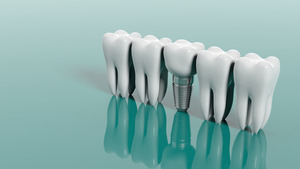
What’s the best way to replace your missing teeth? While there’s no one answer that’s right for everybody – each patient has their own unique needs to consider, after all – many dentists consider dental implants to be a cut above traditional options like bridges and dentures. What makes implants different from other tooth replacements? And are they really the top choice for fixing an incomplete grin? Here are the facts.
How Do Dental Implants Work?
The key point that makes dental implants different from traditional bridges and dentures is that they can act as new tooth roots. This is because they are placed into the jaw and become integrated with the bone. A lifelike restoration is eventually placed on the implant post(s), giving them the appearance of real teeth.
What Sets Dental Implants Apart from Other Tooth Replacements?
Many dentists say that getting dental implants is the next best thing to getting your original teeth back. They don’t just look natural; they also function in a realistic way. Most notably, dental implants can give your jawbone the same kind of stimulation that normally comes from tooth roots, which means you’ll be less likely to experience bone loss in your jaw.
Another notable feature of dental implants is that they are much sturdier than traditional dentures and bridges. Being fused with the jawbone gives them excellent stability. As a result, once your mouth has fully healed, there won’t be any restrictions on your diet; you can eat whatever you want.
Finally, there’s the longevity of dental implants to consider. Bridges and dentures usually need to be replaced every 5 to 7 years. Meanwhile, dental implants are known to last 30 years or more. As long as you’re taking good care of them, it’s very likely that you’ll be able to keep them for a lifetime.
Dental Implants: The Pinnacle of Replacement Teeth?
Thanks to the various benefits they offer that more traditional treatments can’t, dental implants are sometimes viewed as the pinnacle of tooth replacement solutions. It’s hard to say for certain whether they’ll always be able to maintain that position; dentistry is not a field that stands still, after all. Still, it’s easy to see why many dentists and patients alike consider them a top choice for re-completing smiles.
So, should you get dental implants? The answer depends on your oral health, the bone density in your jaw, and other factors. If you want to find out for sure, reach out to your dentist to set up an implant consultation.
About the Author
Dr. Eric Heisser went to the University of Michigan School of Dentistry. Today he is a Fellow of both the International Congress of Oral Implantologists as well as the Academy of General Dentistry. He works with local dental implant experts to help his patients rebuild their smiles. To set up an implant consultation with Dr. Heisser at Laketown Family Dental in Norton Shores, visit his website or call (231) 737-2273.
 (231) 737-2273
(231) 737-2273

 Appointment
Appointment